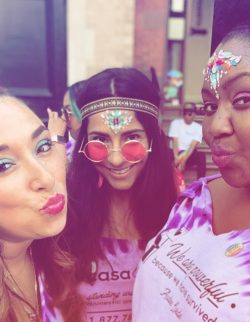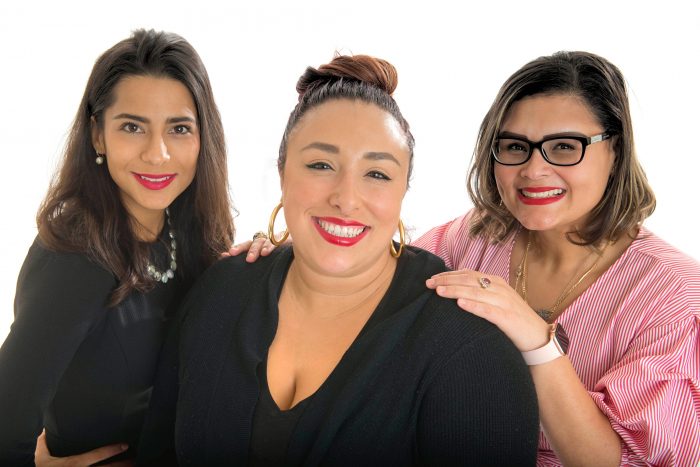Survivor Story
Staff Interview: Roxana
Roxana has worked as a Community Advocacy Specialist at Casa Myrna since 2016, when she moved to Boston from her home state of California. Throughout the week, she visits district courts, health centers, and the Family Justice Center to literally meet survivors where they’re at. She’s fiercely committed to making sure survivors get to take charge of their own journeys to escaping abuse. Outside of work, Roxana is a foodie who loves hiking and climbing.
What does a Community Advocacy Specialist do at Casa Myrna?
Community Advocacy Specialists are stationed at different locations around Boston where they are points of contact for domestic violence survivors and connections to support. Often the survivors we meet are seeking other sorts of supports that may or may not be related to abuse, for example medical care or legal services. I’m most often located at the district courts, where I provide bilingual Spanish and English assistance for survivors seeking restraining orders.
How do you assist survivors in the court setting?
In the court setting, it can be very strange for folks when you approach them because they’re already hyper-vigilant, so I’m stationed at a desk where people can approach me instead. I also try to build good relationships with clerks so that I can sit in and overhear when someone comes in to file a restraining order. I’ll let them know I’m available to assist at a moment where they seem open to it, less stressed out. I also watch out for people who look like they’re struggling to understand the documents, perhaps because English isn’t their first language.
First, I explain that I’m not affiliated with the court or the police. I’m there for them, to provide support for them, to guide them through the process. I always let them know that no matter what they decide—whether they decide not to go for a restraining order that day, whether they decide to drop it later—I will support them in whatever way I can.

Community Advocacy program coworkers Camila, Roxana, and Cynthia at Casa Myrna’s Boston Pride contingent on June 8, 2019!
Do you always provide advocacy and support one on one, or in other ways as well?
Recently I started facilitating a support group for Spanish-speaking survivors in partnership with a non-domestic violence organization. The group is focused on building community among folks with similar experiences. Going in, I planned an agenda of what topics we would discuss over the six weeks. But once the group started, the participants were in control and took it in their own direction—and that’s an important part of it, that they feel in control.
Some of the topics they wanted to discuss included motherhood, safe sex, contraceptives, and toxic masculinity: what does that look like in the Latin@ community? We began by exploring the messages popular songs send about relationships and gender roles. Because all the participants in this group were mothers, I also put together a workshop on developmental stages, as a starting point for exploring what they experienced as children, what they’re experiencing with their own children as mothers, and what they might want to change in their own parenting styles based on those reflections.
The dynamic isn’t like structured group therapy or classroom education. It’s a group of women talking together about really intimate subjects that are important to them. Ultimately, they do end up talking about domestic violence and what they’ve experienced, but it’s freer and more open because they get there on their own.
What kind of impact do these groups having on the participants?
Even in a short time, I’ve seen huge changes in the participants’ self-esteem and in their sense of empowerment. Normally when I’m out in the community, the interactions I have with survivors are very individualized and very confidential. At times people feel like they’re the only one, despite what you might tell them about the statistics. But in a group where everyone is speaking openly, participants come to understand on an emotional level that they’re not alone.
It’s also amazing seeing how the group participants help and bring strength to each other. A lot of the them are here as immigrants, and their only support, the only person they knew here in the U.S., was their abuser. Having the community of the group, where they’re able to count on each other, is so important. Some of them have described it as forming their own family.

Roxana with her Community Advocacy Program teammates Camila (center) and Yoanna (right)
When you were growing up, did you have any experiences seeing domestic violence in your own community?
When I was a kid, my mother worked at a migrant center, first as a daycare teacher and then as the director. Sometimes she would let us know that there would be a mom and child coming stay with us for a couple of weeks. Obviously when I was small, I didn’t necessarily understand what was going on. At the time we just assumed our mom was providing this family housing. But as I got older I realized she was assisting women who had experienced domestic violence and had nowhere else to go. My mom would find out about the abuse from these women when, for example, they confided to her while dropping off their children at daycare.
Both of my parents also did a lot of advocacy with migrant farmworkers, helping them fight for their rights and safety. Often the managers of the farms sexually abused and harassed the women workers. I thought my parents were amazing for providing those women advocacy and support. I think that’s where I got my own passion for social justice, for helping people: from my parents.
Do you have any messages for survivors in the community?
Start by talking to somebody, maybe on SafeLink (1.877.785.2020), which is confidential and available 24/7/365. We’re here assist you at whatever stage you’re in. If you just need to talk, there’s always going to be someone who can listen
And be kind to yourself. Often, I find that when survivors go back to the abuser, it’s because they’ve gotten burned out or overwhelmed trying to do everything they’re being told to do by their providers all at once. Being kind to yourself means taking things more at your own pace. It’s your journey, and you’re in control.
Your tax deductible gift ensures survivors won’t walk alone as they forge their own paths towards brighter futures. Donate so that Roxana, Cynthia, John, and other Casa Myrna advocates can be there for them every step of the way.
Meet More Faces for Change
Read an interview with Cynthia, Dorchester Community Engagement Coordinator!
Read an interview with John, Emergency Shelter Advocate!


